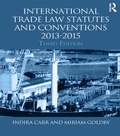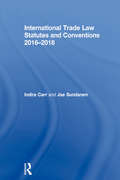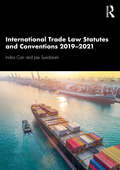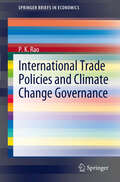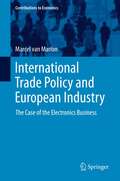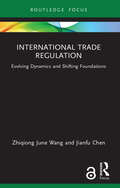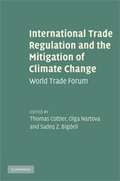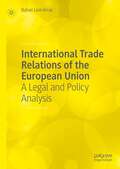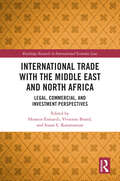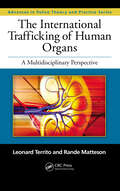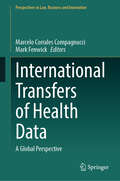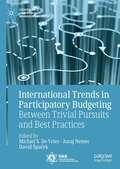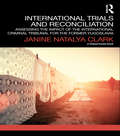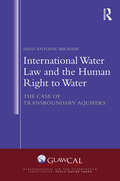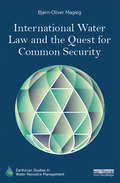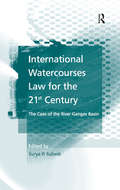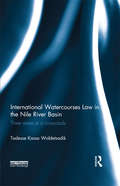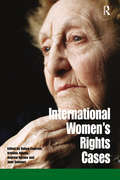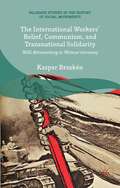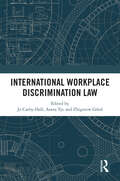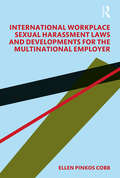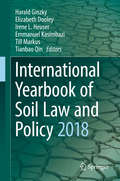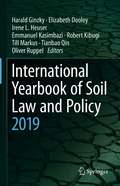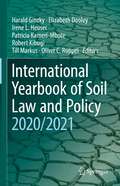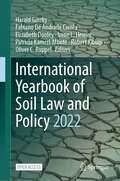- Table View
- List View
International Trade Law Statutes and Conventions 2013-2015
by Indira Carr Miriam GoldbyThis new edition of International Trade Law Statutes and Conventions presents all the key legislation for international trade law in one student-friendly volume. Developed in response to feedback from lecturers and students, this book is: • Up-to-date with the law: this book provides a fully current and comprehensive collection of legislation • Tailored to course outlines: content has been curated to align with international trade law courses • Exam friendly: conforming to regulations, this is an un-annotated text that is suitable for exam use • Easy to use: a clear and attractive text design, detailed table of contents and multiple indices provides ease of reference and navigation Ideal for course and exam use, as well as for reference, this book is a perfect companion resource to student learning and exam success.
International Trade Law Statutes and Conventions 2016-2018
by Indira Carr Jae SundaramInternational Trade Law Statutes and Conventions 2016-2018 presents all the key legislation for international trade law in one student-friendly volume. Developed in response to feedback from lecturers and students, this book is: • up-to-date with the law: this book provides a fully current and comprehensive collection of legislation • tailored to course outlines: content has been curated to align with international trade law courses • exam friendly: conforming to regulations, this is an un-annotated text that is suitable for exam use • easy to use: a clear and attractive text design, detailed table of contents and multiple indices provides ease of reference and navigation Ideal for course and exam use, as well as for reference, this book is a perfect companion resource for student learning and exam success.
International Trade Law Statutes and Conventions 2019-2021
by Indira Carr Jae SundaramInternational Trade Law Statutes and Conventions 2019–2021 presents all the key legislation for international trade law in one student-friendly volume. Developed in response to feedback from both lecturers and students, the book: provides an up-to-date, fully comprehensive collection of current legislation is curated to align with international trade law courses is an un-annotated text, conforming to regulations so that it can be used during exams features a clear and attractive text design, detailed table of contents, and multiple indices to provide ease of reference and navigation. Ideal for coursework, exam use, and general reference work, this is the perfect companion for anyone studying this important and fast-moving area of law.
International Trade Policies and Climate Change Governance
by P. K. RaoThis work offers a synthesis of the current approaches toward an integration of international trade and climate change, with a view to fostering potential improvements in policies and institutions affecting these. A number of pragmatic measures are proposed with reference to the WTO and the United Nations Framework Convention on Climate Change (UNFCCC) regimes, which are expected to contribute toward enhanced climate change governance, as well as promoting international trade.
International Trade Policy and European Industry: The Case of the Electronics Business
by Marcel Van MarionTrade policy has played a vital role in the decline of European electronics business. The events that resulted in the disappearance of the European television industry, of a European and Japanese video recorder format and of other European consumer electronics are directly related to market structures in exporting countries and business practices. In this book, factual business data shows and economic models explain how restrictive trade practices result in elimination of efficient competitors in export markets. It deals with the memorable case how a videocassette recorder format was established by dumping and how politics enabled it. An innovative tariff increase for CD players was invalidated by heavy dumping, causing closure of production in Europe. European CTV industry succumbed under permanent dumping and a series of biases - as the interest of a state-owned company - and serious errors making trade instruments void and rules irreconcilable with international agreements. Practical and theoretical examples and explanations, some in detail, of trade rules are provided. The book sketches events - carelessness, prejudice or special interests, arbitrary and false application of trade instruments and fraud - resulting in disappearance of various European electronics business segments.
International Trade Regulation: Evolving Dynamics and Shifting Foundations (Routledge Research in International Economic Law)
by Zhiqiong June Wang Jianfu ChenThe international trade regulatory system is a dynamic system that has been evolving throughout its history. Tension and conflict are part of the system. While calls for the abolition of the principal trade regulation authority, the WTO, have failed to understand this nature of the system, proponents for reforms have so far not paid sufficient attention to the evolving nature of tension and conflict. This book examines the evolving dynamics in international trade regulation from the conclusion of GATT in 1947 to the current crisis facing the WTO, from a perspective of emerging powers of developing countries with a focus of China as the latest force that demands reforms of the international trade regulatory regime. There is an extensive body of scholarship on ideological struggles, the rise of developing countries, geopolitical contest, the emerging powers (especially China), the use, misuse or abuse of trading rules and so on. There is, however, a lack of a single concise research book that synthesises these underlying causes and factors into a coherent and precise analytical theme. This book attempts to fill this research gap by building upon the existing scholarship and placing the various tensions and conflicts in a perspective that treats them as dynamic factors that have propelled a continuing process of evolution of the international trade regulation. The book will interest those researching on international trade regulation as well as development studies.
International Trade Regulation and the Mitigation of Climate Change
by Thomas Cottier Olga Nartova Sadeq Z. BigdeliWhat can trade regulation contribute towards ameliorating the GHG emissions and reducing their concentrations in the atmosphere? This collection of essays analyses options for climate-change mitigation through the lens of the trade lawyer. By examining international law, and in particular the relevant WTO agreements, the authors address the areas of potential conflict between international trade law and international law on climate mitigation and, where possible, suggest ways to strengthen mutual supportiveness between the two regimes. They do so taking into account the drivers of human-induced climate change in energy markets and of consumption.
International Trade Relations of the European Union: A Legal and Policy Analysis
by Rafael Leal-ArcasThis book examines the need for greater legal coherence within international trade negotiations between the European Union (EU) and external trade relations. An introspective analysis of EU trade law and policy is presented that highlights the complex issue of EU unity. A particular focus is given to the Doha Round and the General Agreement on Trade in Services, with empirical analysis placing the negotiations not just within the context of international trade law, but also within broader social and political contexts. This book aims to provide an interdisciplinary understanding of the EU’s international trade negotiations. It will be relevant to researchers and policy-makers interested in international trade and EU law.
International Trade with the Middle East and North Africa: Legal, Commercial, and Investment Perspectives (Routledge Research in International Economic Law)
by Hossein Esmaeili, Vivienne Brand, and Susan L. KaramanianThis book provides an interdisciplinary analysis of trade relations with the Middle East and Arab countries from the perspectives of law, business, policy and culture in the Middle East and the Arab world and their interaction with the wider world, particularly Western countries.The rapidly evolving economy of the Middle East and the Arab region is undergoing significant change, and establishing modern foreign ownership law, robust company, business and investment regulations, modern legal professions while keeping its basic traditional and Islamic principles. This book covers a number of important theoretical and practical aspects of commercial and trade relationships and law. It examines case studies of trade and investment relations between Arab and Middle Eastern countries and Western Countries, such as Australia, UK and US, touching on such topics as corporation law, arbitration and foreign judgments, future mobility and disruptive technology law, financial services law, charity law, trusts and cultural law.Exploring emerging trade and investment ties between Arab and Middle Eastern countries and Western countries, it will be of interest to students, academics and practitioners with an interest in international trade and investment law.
The International Trafficking of Human Organs: A Multidisciplinary Perspective (Advances in Police Theory and Practice)
by Leonard Territo Rande MattesonInternational illicit trade in human organs is on the increase, fueled by growing demand and unscrupulous traffickers. In order to truly understand the problem of organ trafficking, an analysis should take into account the various perspectives that come into play in this multifaceted issue. With contributions from international scholars and experts
International Transfers of Health Data: A Global Perspective (Perspectives in Law, Business and Innovation)
by Marcelo Corrales Compagnucci Mark FenwickIn an age of digital globalization, navigating the complex landscape of international health data transfers presents significant challenges. This anthology delves into the intricate matrix of regulations, policies, and technologies that govern the transnational flow of health data and provides a comprehensive analysis of the legal frameworks across multiple jurisdictions. This volume sheds light on a range of topics, spanning the multifaceted data transfer mechanisms anchored in the General Data Protection Regulation to the landmark Schrems II court decision that resulted in the invalidation of the Privacy Shield, giving rise to the new Standard Contractual Clauses and the EU-US Data Privacy Framework. These seminal events triggered reforms not just in Europe and the US but have had far-reaching effects on global policy frameworks. In light of these developments, the book explores the contemporary regulatory shift spanning countries from the Global North and Global South. This comprehensive exploration encompasses a diverse array of nations, from the European Union, United Kingdom, United States, Japan, South Korea and Taiwan, to China, Australia, Nigeria, Colombia and India. With insights from leading experts and enriched by global case studies, this collection offers a holistic view of the evolving dynamics in international health data transfers. The book provides an indispensable resource for policymakers, legal scholars, healthcare professionals, and technology enthusiasts traversing the intersection of law, ethics, and global health data in the 21st century.
International Trends in Participatory Budgeting: Between Trivial Pursuits and Best Practices (Governance and Public Management)
by Michiel S. De Vries Juraj Nemec David ŠpačekThis book analyses the participatory budgeting practice as it has evolved in evaluated countries, focusing on what is substantially at stake concerning the budget and issues involved, the actual participation, the way such processes are organised and administered, and the outcomes of such processes. It concludes that participatory budgeting in selected European countries is far away from the level of ‘best practice’, but that all experiences are not just trivial pursuits. The information collected serves to check, to what extent participatory budgeting as practiced in the countries involved presents a real attempt to change municipal budgets towards addressing the needs of marginalized groups and to improve decision-making based on local democracy and participation, or whether these processes as such are to be judged to be more important than any output and outcomes. The practices can neither be seen as a process of policy diffusion nor as a process of policy mimesis. The terminology of participatory budgeting remains, but the tools to achieve the goals resulted only in marginal changes in the status quo in municipalities in European countries practicing participatory budgeting, instead of resulting in radical changes to increase spending in favor of marginalized groups.Chapter 15 'Unraveled Practices of Participatory Budgeting in European Democracies' is available open access under a CC BY 4.0 license.
International Trials and Reconciliation: Assessing the Impact of the International Criminal Tribunal for the Former Yugoslavia
by Janine Natalya ClarkTransitional justice is a burgeoning field of scholarly inquiry. Yet while the transitional justice literature is replete with claims about the benefits of criminal trials, too often these claims lack an empirical basis and hence remain unproven. While there has been much discussion about whether criminal trials can aid reconciliation, the extent to which they actually do so in practice remains under-explored. This book investigates the relationship between criminal trials and reconciliation, through a particular focus on the International Criminal Tribunal for the former Yugoslavia (ICTY). Using detailed empirical data – in the form of qualitative interviews and observations from five years of fieldwork – to assess and analyze the ICTY’s impact on reconciliation in Bosnia-Hercegovina, Croatia and Kosovo, International Trials and Reconciliation: Assessing the Impact of the International Criminal Tribunal for the former Yugoslavia argues that reconciliation is not a realistic aim for a criminal court. They are, Janine Clark argues, only one part of a rich tapestry of justice, which must also include non-retributive transitional justice processes and mechanisms. Challenging many of the common yet untested assumptions about the benefits of criminal trials, this innovative and extremely timely monograph will be invaluable for those with interests in the theory and practice of transitional justice.
International Water Law and the Human Right to Water: The Case of Transboundary Aquifers (ISSN)
by Imad Antoine IbrahimThis book examines the development of international law applicable to Transboundary Aquifers (TBAs) considering the Human Right to Water and Sanitation (HRWS). The purpose is to determine how International Water Law (IWL) and the HRWS can be harmonized in the context of TBAs. This is important given rules and instruments adopted to address this topic are relatively nascent, and the field itself is still in the process of developing regulatory frameworks. Taking the application of the HRWS to shared aquifers as a case study, the work discusses whether IWL and International Human Rights Law complement each other. The response to this question requires an analysis of the development of International Groundwater Law and its challenges, the evolution of the HRWS, the nature of transboundary groundwaters, and the interplay between these two fields. The author argues that IWL agreements should contain a provision related to the HRWS to ensure the protection of this right with a stipulation included in the nonbinding instrument that tackles shared groundwaters: the Draft Articles on the Law of Transboundary Aquifers adopted in 2008 through the United Nations General Assembly Resolution. The book will be of interest to international lawyers, water and human right experts, geologists, and anyone interested in water and human rights issues.
International Water Law and the Quest for Common Security (Earthscan Studies in Water Resource Management)
by Bjorn-Oliver MagsigThe world’s freshwater supplies are increasingly threatened by rapidly increasing demand and the impacts of global climate change, but current approaches to transboundary water management are unsustainable and may threaten future global stability and international security. The absence of law in attempts to address this issue highlights the necessity for further understanding from the legal perspective. This book provides a fresh conceptualisation of water security, developing an operational methodology for identifying the four core elements of water security which must be addressed by international law: availability; access; adaptability; and ambit. The analysis of the legal framework of transboundary freshwater management based on this contemporary understanding of water security reveals the challenges and shortcomings of the current legal regime. In order to address these shortcomings, the present mindset of prevailing rigidity and state-centrism is challenged by examining how international legal instruments could be crafted to advance a more flexible and common approach towards transboundary water interaction. The concept of considering water security as a matter of ‘regional common concern’ is introduced to help international law play a more prominent role in addressing the challenges of global water insecurity. Ways for implementing such an approach are proposed and analysed by looking at international hydropolitics in Himalayan Asia. The book analyses transboundary water interaction as a ‘case study’ for advancing public international law in order to fulfil its responsibility of promoting international peace and security.
International Watercourses Law for the 21st Century: The Case of the River Ganges Basin
by Surya P.SubediThis edited volume presents a comprehensive and comparative view of the law of international watercourses with special reference to the issues facing the Ganges River basin. It provides an analysis of the development of international waterways law and outlines the essentials of the UN Convention on non-navigational uses of international watercourses. Focusing on relations between the three riparian states of the River Ganges and the potential for cooperation, the volume also examines the domestic legal regimes of the area and the political dimension to the issues of sharing the waters of the river. The work presents a comparative picture with an analysis of developments in the Rhine and Mekong basins, comparing developments in the legal regimes of these areas with the experience of South Asia. Presenting an up-to-date analysis of the current law and pointing the direction for future developments, this collection will be a valuable resource for academics, researchers and policy makers working in this area.
International Watercourses Law in the Nile River Basin: Three States at a Crossroads
by Tadesse Kassa WoldetsadikThe Nile River and its basin extend over a distinctive geophysical cord connecting eleven sovereign states from Egypt to Tanzania, which are home to an estimated population of 422.2 million people. The Nile is an essential source of water for domestic, industrial and agricultural uses throughout the basin, yet for more than a century it has been at the centre of continuous and conflicting claims and counter-claims to rights of utilization of the resource. In this book the author examines the multifaceted legal regulation of the Nile. He re-constructs the legal and historical origin and functioning of the British Nile policies in Ethiopia by examining the composition of the Anglo-Ethiopian Treaty of 1902, and analyses its ramifications on contemporary riparian discourse involving Ethiopia and Sudan. The book also reflects on two fairly established legal idioms - the natural and historical rights expressions – which constitute central pillars of the claims of downstream rights in the Nile basin; the origin, essence and legal authority of the notions has been assessed on the basis of the normative dictates of contemporary international watercourses law. Likewise, the book examines the non-treaty based claims of rights of the basin states to the Nile waters, setting out what the equitable uses principle entails as a means of reconciling competing riparian interests, and most importantly, how its functioning affects contemporary legal settings. The author then presents the concentrated diplomatic movements of the basin states in negotiations on the Transitional Institutional Mechanism of the Nile Basin Initiative (NBI) - pursued since the 1990’s, and explains why the substance of water use rights still continued to be perceived diversely among basin states. Finally, the specific legal impediments that held back progress in negotiations on the Nile Basin Cooperative Framework are presented in context.
International Women's Rights Cases
by Andrew Byrnes Robyn Emerton Kirstine Adams Jane ConnorsThe last two decades have seen major advances in the legal protection of the human rights of women around the world. A series of international and national court cases has developed an important body of jurisprudence that has been relied on by courts and advocates in many countries to support women's claims for equality and the full enjoyment of human rights and fundamental freedoms. Growing out of a series of judicial colloquia organized by the Commonwealth Secretariat, this compilation brings together a selection of over fifty significant cases from international and national courts. The cases are grouped by theme and presented in full text or edited format. Together they highlight the way in which courts have used international human rights norms and national constitutional standards to contribute to women's equality. A detailed introduction provides a summary of the significance of the cases and references further material available on women's human rights. Cases decided under United Nations human rights treaties, the European and American Conventions on Human Rights and other international instruments, as well as cases decided by national courts in Asia, Africa, Europe, Australasia, and North America are all included. The compilation will be of interest to all those with an interest in the advancement of the human rights of women especially equality advocates, lawyers and judges, scholars and students.
The International Workers’ Relief, Communism, and Transnational Solidarity (Palgrave Studies in the History of Social Movements)
by Kasper BraskénThe International Workers’ Relief, Communism, and Transnational Solidarity.
International Workplace Discrimination Law
by Jo Carby-Hall, Aneta Tyc and Zbigniew GóralWith contributions from top legal scholars, this edited collection provides an international overview of the most up-to-date issues and new trends in law regarding employment discrimination in different countries. Confronting the US, the UK, Japan on the one hand, with the EU jurisdictions, namely Italy, France, Spain, Greece, Hungary, Slovak Republic and the Czech Republic on the other hand, this book pays special attention to the most significant changes to law in these countries and ongoing challenges they face. The monograph is complementary to a former one entitled "Discrimination and Employment Law: International Legal Perspectives", Joseph Carby-Hall, Zbigniew Góral and Aneta Tyc (eds.), Routledge 2023, and at the same time works as a separate volume. Adopting a problem-solving approach, this monograph offers an in-depth analysis of both anti-discrimination statutory law and of a growing and still developing corpus of case law. This book will appeal to students, academics and practitioners working in the field of labour and employment law, anti-discrimination law and human rights law, as well as to employers, employees, trade unions, the ETUC, the ILO, and policy-makers from all over the world.
International Workplace Sexual Harassment Laws and Developments for the Multinational Employer
by Ellen Pinkos CobbAs the #MeToo movement has become an increasingly global and significant workplace matter, a timely resource compiling must-know international workplace sexual harassment laws for the multinational employer is clearly needed. This book provides a comprehensive compilation of global sexual harassment laws, clearly necessary in this climate but not currently existing until now. It presents legislation addressing workplace sexual harassment in over 50 countries in the European Region, Asia Pacific, Americas, and the Middle East and Africa. Within each region, the laws of individual countries are set forth, as well as some cultural context and recent developments to indicate present and future trends in workplace sexual harassment regulation. Written in clear, plain English for anyone without a legal background to understand, this book is essential reading and a key resource for employment and business attorneys, global employers, managers, human resources professionals, and occupational health and safety professionals. Academics, practitioners, union members, employees, NGOs, and those in the human rights field will also benefit from this timely resource.
International Yearbook of Soil Law and Policy 2018 (International Yearbook of Soil Law and Policy #2018)
by Harald Ginzky Elizabeth Dooley Irene L. Heuser Emmanuel Kasimbazi Till Markus Tianbao QinThis book presents an important discussion on urbanization and sustainable soil management from a range of perspectives, addressing key topics such as sustainable cities, soil sealing, rehabilitation of contaminated soils, property rights and liability issues, as well as trading systems with regard to land take.This third volume of the International Yearbook of Soil Law and Policy is divided into four parts, the first of which explores several aspects of the topic “urbanization and sustainable management of soils.” The second part then covers recent international developments, while the third part presents regional and national reports, and the fourth discusses cross-cutting issues. Given the range of key topics covered, the book offers an indispensible tool for all academics, legislators and policymakers working in this field. The “International Yearbook of Soil Law and Policy” series discusses central questions in law and politics with regard to the protection and sustainable management of soil and land – at the international, national and regional level.
International Yearbook of Soil Law and Policy 2019 (International Yearbook of Soil Law and Policy #2019)
by Harald Ginzky Elizabeth Dooley Irene L. Heuser Emmanuel Kasimbazi Robert Kibugi Till Markus Tianbao Qin Oliver RuppelThis book presents an important discussion on the implementation of sustainable soil management in Africa from a range of governance perspectives. It addresses aspects such as the general challenges in Africa with regard to soil management; the structural deficiencies in legal, organizational and institutional terms; and specific policies at the national level, including land cover policies and persistent organic pollutants.This fourth volume of the International Yearbook of Soil Law and Policy is divided into four parts, the first of which deals with several aspects of the theme “sustainable soil management in Africa.” In turn, the second part covers recent international developments, the third part presents regional and national reports (i.a. Mexico, USA and Germany), and the fourth discusses cross-cutting issues(i.a. on rural-urban interfaces). Given the range of key topics covered, the book offers an indispensible tool for all academics, legislators and policymakers working in this field.The “International Yearbook of Soil Law and Policy” is a book series that discusses central questions in law and politics with regard to the protection and sustainable management of soil and land – at the international, national and regional level.
International Yearbook of Soil Law and Policy 2020/2021 (International Yearbook of Soil Law and Policy #2020)
by Harald Ginzky Irene L. Heuser Oliver C. Ruppel Elizabeth Dooley Till Markus Robert Kibugi Patricia Kameri-MboteThis book presents an important discussion on land tenure rights for the effective implementation of sustainable soil management provisions. It investigates a variety of aspects, such as the clash of modern and traditional tenure concepts, forms of illegal or illegitimate land acquisition, and the preconditions for legal and legitimate investments. In addition, the book analyses the challenges to ensuring secure land tenure rights in Africa and in Germany. Lastly, it provides information on the role of women in this context.This fifth volume of the International Yearbook of Soil Law and Policy is divided into four parts, the first of which deals with various aspects of the theme “Land Tenure Rights and Sustainable Soil Management”. The second part covers recent international developments, the third part presents regional and national reports, and the fourth discusses overarching issues. Given the range of key topics covered, the book offers an indispensable tool for all academics, legislators and policymakers working in this field.The “International Yearbook of Soil Law and Policy” series discusses central questions in law and politics with regard to the protection and sustainable management of soil and land – at the international, national, and regional level.
International Yearbook of Soil Law and Policy 2022 (International Yearbook of Soil Law and Policy #2022)
by Harald Ginzky Fabiano De Andrade Corrêa Elizabeth Dooley Irene L. Heuser Patricia Kameri-Mbote Robert Kibugi Oliver C. RuppelThis open access book presents an important discussion on the interface between sustainable soil management and climate mitigation and adaptation. It investigates a variety of aspects in this context, such as the political and societal consequences for countries in the Global South, an assessment of the outcomes of the UNFCCC Conference of Parties held in Glasgow, appropriate legal instruments to promote desealing, regulatory concepts for negative emissions in soil and land use, the debate in Europe on carbon uptake in soils and the climate-related policy of the Convention on Biological Diversity. Lastly, it provides information on recent court rulings on climate mitigation in Germany and Australia and their relevance for sustainable soil management.This sixth volume of the International Yearbook of Soil Law and Policy is divided into four parts, the first of which deals with various aspects of the theme “Climate Mitigation and Adaptation and Sustainable Soil Management.”The second part covers recent international developments, the third presents regional and national reports, and the fourth discusses overarching issues. Given the range of key topics covered, the book offers an indispensable tool for all academics, legislators and policymakers working in this field. The “International Yearbook of Soil Law and Policy” series discusses central questions in law and politics with regard to the protection and sustainable management of soil and land – at the international, national, and regional level.
